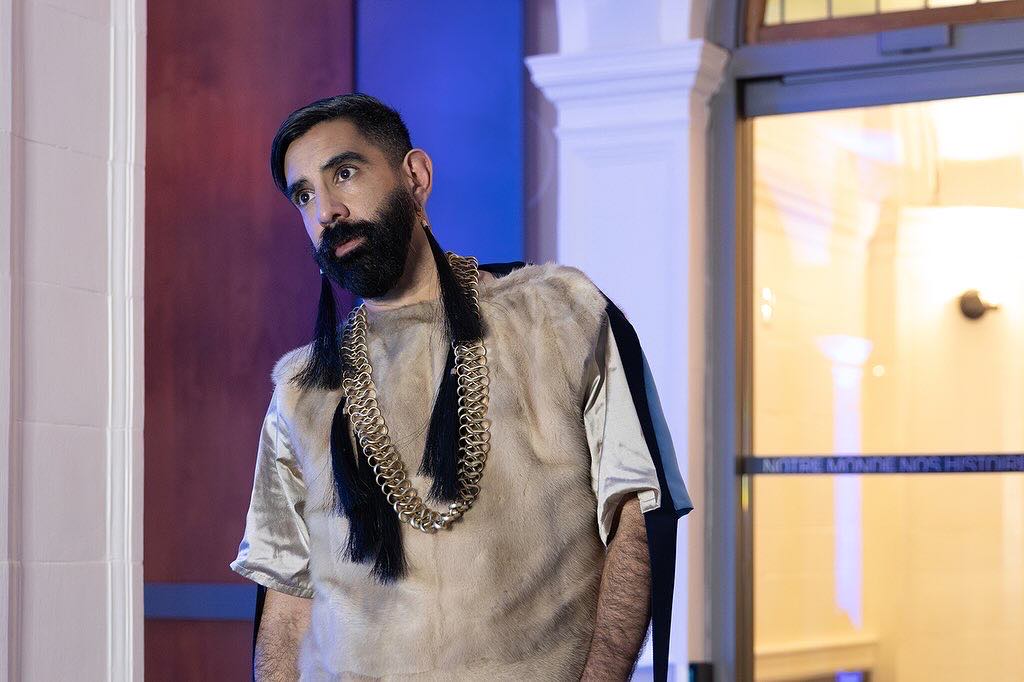Armando Perla ist ein*e nicht-binäre*r queere*r Mestize (Nahua und Euro-Salvadorianer*in), internationale*r Kurator*in und Museumsberater*in und derzeit Chefkurator*in am Textile Museum of Canada. Perla ist außerdem Vizepräsident*in des Vorstands der Canadian Museums Association und war zuvor Chefkurator*in für die Toronto History Museums der Stadt Toronto.
Von 2019 bis 2021 war Perla Vorstandsmitglied des Internationalen Komitees für ethische Dilemmata (IC-Ethics) des Internationalen Museumsrates (ICOM). Von 2021 bis 2022 kuratierten sie eine große Kinderausstellung zum Thema historisches Gedächtnis und Menschenrechte für das Entwicklungsprogramm der Vereinten Nationen und die Schweizer Agentur für internationale Zusammenarbeit in Zentralamerika in El Salvador. Perla war außerdem Assistenzprofessor*in für Decolonization and Race in Museums mit einem Master of Museum Studies an der Fakultät für Information der Universität Toronto und fungierte außerdem als internationale*r Berater*in für Museen, Menschenrechte und soziale Inklusion für die Stadt Medellin, Kolumbien. Sie gehörten zum Gründungsteam des Kanadischen Museums für Menschenrechte und waren Projektleiter*in im Schwedischen Museum für Migration und Demokratie. Während ihrer Tätigkeit für das Kanadische Museum für Menschenrechte waren sie auch als Lehrbeauftragte*r an der juristischen Fakultät der Universität Manitoba und am Global College der Universität Winnipeg tätig. Perla hat einen Bachelor of Laws der Université Laval in Kanada und einen Master of Laws in Internationalen Menschenrechten der Universität Lund und dem Raoul Wallenberg Institute of Human Rights and Humanitarian Law in Schweden. Bevor sie im Museumssektor tätig wurden, hatte Perla verschiedene Funktionen in Menschenrechtsorganisationen in Nordamerika, Lateinamerika und Europa inne. Perla ist derzeit Doktorand*in in Kunstgeschichte und Museologie an der Universität von Montreal. Für ihre Forschung erhielten sie 2021 das Joseph-Armand Bombardier Canada Graduate Doctoral Fellowship.
Armando Perla is a non-binary queer mestizo (Nahua and Euro-Salvadoran) international curator and museum consultant who is currently Head Curator at the Textile Museum of Canada. Perla is also Vice-President of the board of the Canadian Museums Association and previously, they were Chief Curator for the Toronto History Museums at the City of Toronto.
From 2019 – 2021, they were a board member of the International Council of Museums’ (ICOM) International Committee on Ethical Dilemmas (IC-Ethics). Between 2021 and 2022, they curated a major children’s exhibition on historic memory and human rights for the United Nations Development Program and the Swiss Agency for International Cooperation in Central America in El Salvador. Perla also held the position of Assistant Professor on Decolonization and Race in Museums with the Master of Museum Studies, Faculty of Information at the University of Toronto and also served as International Advisor on Museums, Human Rights and Social Inclusion for the City of Medellin, Colombia. They were part of the founding team of the Canadian Museum for Human Rights and Project Leader at the Swedish Museum of Migration and Democracy. During their tenure at the Canadian Museum for Human Rights they were also an adjunct professor both at the faculty of law at the University of Manitoba and in the Global College at the University of Winnipeg. They hold a Bachelor of Laws from l’Université Laval in Canada and a Master of Laws in International Human Rights Law from Lund University and the Raoul Wallenberg Institute of Human Rights and Humanitarian Law in Sweden. Prior to working in the museum sector, Perla held several roles in human rights organizations in North America, Latin America, and Europe. Perla is currently a PhD candidate in Art History and Museology at the University of Montreal and in 2021 was awarded the Joseph-Armand Bombardier Canada Graduate Doctoral Fellowship for their research. (Foto: ©Michael Patten (BACA))
Session: Visionen leben: Vorbilder, Strategien, Handlungswege für das Museum von morgen


